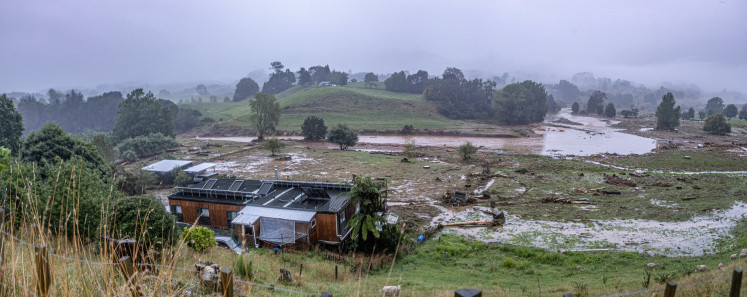Popular Reads
Top Results
Can't find what you're looking for?
View all search resultsPopular Reads
Top Results
Can't find what you're looking for?
View all search resultsGermany's new govt orders border police to reject most asylum seekers
Change text size
Gift Premium Articles
to Anyone
 Officers of the German Federal Police (Bundespolizei) escort a group of migrants near Forst, eastern Germany on October 11, 2023, during a patrol near the border with Poland. Germany's new government on May 7, 2025 said that it would reject most asylum seekers at its borders as conservative Chancellor Friedrich Merz seeks to limit irregular immigration and curb the rise of the far-right. The move is a key part of Merz's plans to wrest the initiative away from the anti-immigration Alternative for Germany (AfD), which came second in February's general election and has continued to climb in the polls. (AFP/Jens Schlueter)
Officers of the German Federal Police (Bundespolizei) escort a group of migrants near Forst, eastern Germany on October 11, 2023, during a patrol near the border with Poland. Germany's new government on May 7, 2025 said that it would reject most asylum seekers at its borders as conservative Chancellor Friedrich Merz seeks to limit irregular immigration and curb the rise of the far-right. The move is a key part of Merz's plans to wrest the initiative away from the anti-immigration Alternative for Germany (AfD), which came second in February's general election and has continued to climb in the polls. (AFP/Jens Schlueter)
G
ermany's new government on Wednesday said that it would reject most asylum seekers at its borders as conservative Chancellor Friedrich Merz seeks to limit irregular immigration and curb the rise of the far-right.
The move is a key part of Merz's plans to wrest the initiative away from the anti-immigration Alternative for Germany (AfD), which came second in February's general election and has continued to climb in the polls.
Merz said he had informed French President Emmanuel Macron and Polish Prime Minister Donald Tusk in advance, telling Welt TV that the "temporary" measures "are necessary as long as we have such high levels of irregular migration in the European Union".
Germany's new government, installed on Tuesday, has moved to boost its border police and ordered officers to reject undocumented migrants including asylum seekers, Interior Minister Alexander Dobrindt said.
Exceptions would be made for "vulnerable groups" including pregnant women and children, he added.
To implement the move, Dobrindt reversed a directive from 2015, at the height of the European migration crisis when Germany welcomed more than a million people mainly from Syria and Afghanistan.
Bild daily said that Dobrindt had given an order for 2,000 to 3,000 extra federal officers to be sent to Germany's borders, in addition to the 11,000 already in place.
News outlet Der Spiegel said police would have to work shifts of up to 12 hours a day to enforce the new regime.
Federal police union chief Andreas Rosskopf told the Rheinische Post newspaper that "the reinforcement [...] has started" in line with the new instructions.
The aim was to guarantee "humanity and order" in migration, Dobrindt said, adding that order should be "given greater weight and strength than may have been seen in the past".
AfD 'agitation'
The new government's move upset some neighbors, with Switzerland saying it "regrets" that the measures were taken "without consultation".
Speaking alongside Merz at a press conference in Warsaw, his Polish counterpart Donald Tusk urged Germany to "concentrate on the EU's external borders" and preserve the Schengen zone.
Merz stressed that the controls would be "carried out in a way that will not cause problems for our neighbors", adding that Germany wanted to "solve this problem together" with other EU countries.
Domestically, Merz has argued that tough measures are needed to ease voters' concerns and to halt the rise of the AfD.
The AfD won a record of more than 20 percent in the elections, second only to Merz's conservative CDU/CSU alliance, and has since risen further in opinion polls, at times coming first.
The coalition agreement between the CDU/CSU and the center-left Social Democrats (SPD) also says that all people arriving at German borders without documents will be refused entry, including those seeking asylum.
This last point has raised controversy, with some in the SPD voicing concerns that it may not be compatible with European Union law.
The agreement also says increased border checks are to remain in place until "there is effective protection of external EU borders".
Amid a spate of violent attacks blamed on foreign nationals in the run-up to February's election, Merz made a crackdown on irregular migration a key theme of his campaign.
At one point, he relied on AfD support in parliament to push through a motion demanding a crackdown on immigration, a maneuver widely seen as breaching a "firewall" of non-cooperation with the party.
Last week, Germany's BfV domestic intelligence agency said it had designated the AfD a "right-wing extremist" organization.
It based the designation on a lengthy internal report given to the interior ministry but not made public.
Der Spiegel said the report refers to statements made by hundreds of AfD members at all levels, proving that the party is carrying out "continuous agitation" against migrants, refugees and Muslims.
It also points to AfD figures taking up the slogan of "remigration", a reference to large-scale deportations of foreigners.
The BfV's move sparked fresh calls for the party to be banned and an indignant reaction from the AfD itself, which mounted a legal challenge to the designation on Monday.








